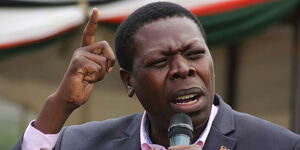A letter allegedly shared between two former colonialists regarding Mzee Jomo Kenyatta's ancestral heritage sparked debate across various social media platforms.
The letter dated September 21, 1953 - shared by Levin Opiyo on his Facebook page claimed that Jomo's father was in fact of Abyssinian origin.
"I wrote to a friend in Kenya who knows a good deal about natives of that country. He replied that most he (Jomo) assuredly was not a pure-bred Kikuyu," stated an excerpt of the letter.
The writer went on to claim that although Jomo's mother was Kikuyu, his father was a member of the minority Oromo (Galla) tribe that had settled along the Tana River.
"My own opinion is that he is the son of one of the numerous Sudanese who live on a location on the boundaries of the Nairobi City area and adjoining Kikuyu Reserve," read a section of the controversial letter.
Netizens took to facebook, with some claiming that this was just a ploy by the British colonialists to divided and conquer the nation.
"I think this is part of the larger colonial narrative of divide and rule where the colonial administrator tried to categorize the African depending on looks and used this as a justification for creating hierarchies in humans and therefore deny power to some people," Doseline Kiguru posted on Opiyo's page.
Others simply claimed Kenyatta's heritage was the subject of debate created to give him a national outlook that would set him up as a viable future leader of the country.
"Jomo Kenyatta's roots are shrouded in mystery. Kikuyus, Luhyas and Maasais claim him. Now, the Sudanese and Swahili now claim him. I think it was convenient to keep it that way so that he could claim a national outlook, even to adopt a name synonymous with no ethnicity," Kennedy Muitherero posted.
There are those who claimed that Mzee Jomo was the son of a former Ugandan King - Kaberega alias Omukama.
Here's a screengrab of the controversial letter as well as more reactions:












